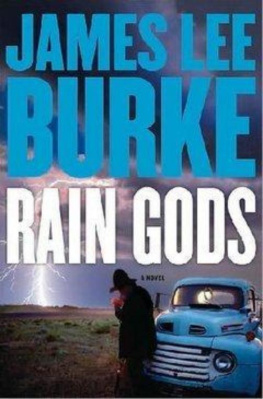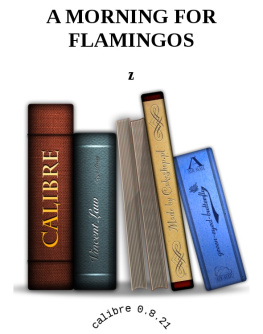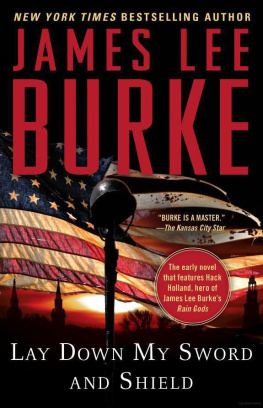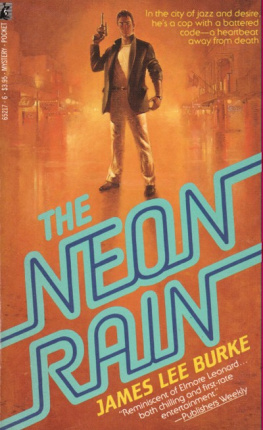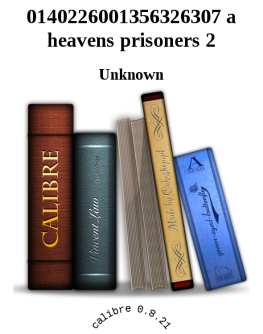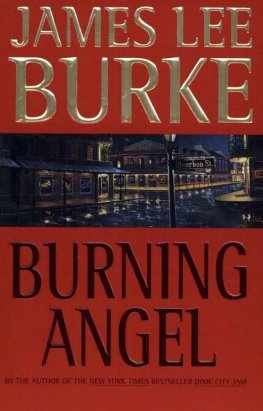James Lee Burke - Dixie City Jam
Here you can read online James Lee Burke - Dixie City Jam full text of the book (entire story) in english for free. Download pdf and epub, get meaning, cover and reviews about this ebook. year: 1994, genre: Detective and thriller. Description of the work, (preface) as well as reviews are available. Best literature library LitArk.com created for fans of good reading and offers a wide selection of genres:
Romance novel
Science fiction
Adventure
Detective
Science
History
Home and family
Prose
Art
Politics
Computer
Non-fiction
Religion
Business
Children
Humor
Choose a favorite category and find really read worthwhile books. Enjoy immersion in the world of imagination, feel the emotions of the characters or learn something new for yourself, make an fascinating discovery.
- Book:Dixie City Jam
- Author:
- Genre:
- Year:1994
- Rating:5 / 5
- Favourites:Add to favourites
- Your mark:
- 100
- 1
- 2
- 3
- 4
- 5
Dixie City Jam: summary, description and annotation
We offer to read an annotation, description, summary or preface (depends on what the author of the book "Dixie City Jam" wrote himself). If you haven't found the necessary information about the book — write in the comments, we will try to find it.
Dixie City Jam — read online for free the complete book (whole text) full work
Below is the text of the book, divided by pages. System saving the place of the last page read, allows you to conveniently read the book "Dixie City Jam" online for free, without having to search again every time where you left off. Put a bookmark, and you can go to the page where you finished reading at any time.
Font size:
Interval:
Bookmark:
DIXIE CITY JAM
BY
JAMES LEE BURKE
THE SEVENTH BOOK IN THE DAVE ROBICHEAUX SERIES
COPYRIGHT 1994
for Porteus and Alice Burke
chapter one
Not many people believe this, but in the early months of 1942
Nazi submarines used to lie in wait at the mouth of the Mississippi for the tankers that sailed without naval escort from the oil refineries at Baton Rouge into the Gulf of Mexico.
It was a shooting gallery. Because of wartime censorship the newspapers and radio carried no accounts of the American ships sunk off the Louisiana coast, but just after sunset people could see the oil fires burning on the southern horizon, like a quickening orange smudge low in the winter sky.
As a little boy in New Iberia, I heard shrimpers talk about the burned, oil-coated bodies of four merchant sailors who had been found floating like lumps of coal in an island of kelp, their sightless eyes and poached faces strung with jellyfish.
I had nightmares for many years about Nazis, who I imagined as pinch-faced, slit-eyed creatures who lived beneath the waves, not far from my home, and who would eventually impose a diabolical design upon the earth.
While scuba diving in college, on a calm, windless day, I accidentally found one of those submarines in sixty feet of water, resting at an angle on its keel, the deck rails and forward gun gray and fuzzy with seaweed, a chain of tiny-bubbles rising from the stern.
My heart was tripping against my rib cage, the blood vessels tightening in my head, but I refused to be undone by my childhood fears, and I swam down to the twisted remains of the periscope until I could see the swastika and ship's numbers painted on the side of the conning tower.
I took my bowie knife from the scabbard on my side, and, like the primitive warrior who must touch the body of a slain enemy, I tapped with the butt of the knife on the conning tower's rim.
Then one of the strangest occurrences of my life took place.
I felt a bone-numbing coldness in the water, where there had been none before; then a sound, a vibration, like a wire cable snapping, rang through the entire length of the submarine.
The conning tower began to right itself in the current, the metal plates on the hull grating on the sand, and clouds of silt and trapped oil rose from under the keel. I watched in horror as the submarine seemed to poise itself just above the gulf's floor, streamers of moss fanning back from the tower like tattered battle flags, then dip its bow downward into the darkness and slide over the edge of the continental shelf, my bowie knife toppling onto the rising stern, while sand sharks spun like minnows in the wake of its screws.
I discovered later that there was no mystery about the U-boat.
It had been caught recharging its batteries on the surface, shelled by a U.S. Navy destroyer, then blown out of the water by depth charges, its spine broken; since that time it had scudded and bounced with the currents up and down the floor of the gulf along the Louisiana coast.
But sometimes in a dark moment I wondered about the crew that had gone down in a scream of sirens and whistles and torrents of water bursting through the ruptured plates or cascading down the tower that no one could close in time. Did they claw one another off the ladders? Were they willing to blind or maim or kill one another just to breathe air for a few more seconds? Did they regret embracing the scheme that would make the lights go out all over the world?
Or were they still sailing beneath the waves, their skins pickled in salt, their uniforms nests for moray eels, their plan to turn the earth into a place of concertina wire and guard towers still on track, as certain in prospect as the phosphores-cent and boiling wake of a torpedo streaking toward a distant ship silhouetted against an autumnal moon?
It had been a strange day out on the salt. The wind was hot and sere out of the south, and in the swells you could see the shiny backs of stingrays and the bluish pink air sacs of jellyfish, which meant a storm was probably kicking them in toward shore; then the barometer dropped, the wind died, and the sun looked like a white flame trapped inside the dead water.
It rained for only about five minutes, large, flat drops that struck the water like lead shot, then the sky was clear and hot again and the sweat and humidity ran off your skin like snakes. Far to the south I could see the storm become station-ary. Gray clouds were anchored low on the horizon, and right where they met the water there was a white line of surf and an occasional fork of lightning, like silver threads trembling inside the clouds.
While Batist, the black man who worked for me, put out the lines for gafftop catfish, I slipped on my air tanks, flippers, and mask and went over the side, following the anchor rope down through the cone of translucent green light, down to a level of water that was suddenly cold and moving and gray with silt, spinning with yellow blades of seaweed, perhaps alive with sand sharks that could whisk past you with such energy and force that you felt you had been struck by an invisible hand.
The anchor rope was taut and hard when I touched it. Above me I could see the silhouette of my boat's hull wobbling against the light, the bow dipping into the chop against the pull of the anchor. I blew my mask clear and went down ten more feet along the rope, into a barrel of darkness, of swirling silt that had been blackened with oil, into sounds that shouldn't have been theremetal knocking against itself, like a ball peen hammer bouncing idly off an anvil, steel plates grinding across hard-packed sand, perhaps wire cables lifting in the current and lighting on twisted spars.
I gave it up and headed for the surface, rising once more into water bladed with sunlight, into the predictable world of wind and salt spray blowing against the mask, of gulls and pelicans gliding overhead, of Batist straining with both hands against a stingray he had foul-hooked through the stomach.
I pulled off my tanks and rubbed my head and face dry with a towel. Batist was stripped to the waist, his back knotted with muscle, his cannonball head popping with sweat as he got the gaff into the stingray and lifted it over the gunwale. The gaff had gone all the way through one of the ray's leathery wings.
Batist flopped it on its back, shook the gaff loose, then knelt on one knee and sawed the treble hook out of its stomach. He wiped the blood off his knife, looked at the bent prongs on his hook, then flung the ray overboard with both hands.
'How far down was you, Dave?' he said.
'Thirty or forty feet maybe.'
'Ain't smart. They's a lot of trash down there. They's even trees, yeah, you know that? They float all the way down the Miss'sippi. Some big as your house.'
'I suspect you're right.'
'Well?' He put a cigar in the corner of his mouth.
'What?'
'You found that sub down there?'
'I heard some metal banging around, but I don't know what it is. It's too murky to see anything.'
'Maybe it's a wrecked oil rig down there. You t'ink of that?
Maybe you gonna get tangled up in it, lose your life, Dave, all 'cause that Hippo fellow wavin' ten t'ousand dollars around. He want that sub, let him get his fat butt out here and look for it.'
'Okay, Batist.'
'It don't do no good to be rich in the graveyard, no.'
'I'm getting your drift. I really appreciate it.'
'You ax me my opinion.'
'How about we catch some fish?'
'That's what I been tryin' to do. Except somebody been swimmin' around under my line.'
Hippo Bimstine was a mover in the state Democratic party and probably owned half of the drugstores in New Orleans.
His girth was elephantine, his bejeweled, pudgy fingers and yellow-and-black checkered sports coats legendary. On any given afternoon you could see him in the Pearl on St.
Next pageFont size:
Interval:
Bookmark:
Similar books «Dixie City Jam»
Look at similar books to Dixie City Jam. We have selected literature similar in name and meaning in the hope of providing readers with more options to find new, interesting, not yet read works.
Discussion, reviews of the book Dixie City Jam and just readers' own opinions. Leave your comments, write what you think about the work, its meaning or the main characters. Specify what exactly you liked and what you didn't like, and why you think so.

